I carried two canteens with me. Every 15 minutes, I drank half of a canteen. Every hour, I knew there’d be a place to fill my canteens—a hose or a spigot. My pace was invariable, and my wife was punctual, so I seldom had to wait more than just a few minutes post-march for my ride back. I would open the back hatch on her car and collapse in, unfit to ride up front in the nice bucket seats of her Mustang GT.
Between long walks, I routinely took to rucking the 10 miles along the freeway to the Boca Chica Annex. For the most part, I was on the shoulder of the highway, but where it was possible I was down in the “hinterland,” where the movement was more arduous and challenging.
As the months went on, I discovered that I had gained a measure of celebrity from the local population, both military and civilian. I was approached several times in the dining facility on the Naval Air Station and at the Safeway in town by strangers who asked me (words to the effect of), “Aren’t you the guy/maniac I keep seeing rucking/backpacking along the freeway?” Of course this was spoken in their most animated WTF tone of voice. To those in the military, I would respond, “hooah.” To the civilians, I would respond, “Sorry no, you must be mistaken.” To answer “yes” to civilians would have been a foolish invitation of a litany of pointless questions from a foreign species, so why would I subject myself to that?
Less than halfway through the train-up it became clear that I was not capable of the standards published by the Unit. What now, then? Go for it anyway and make the best of nearly a month spent away from Key West and the old man (my company commander)? The day I was to leave, I picked up my duffle bags and I limped to my car to drive to the airport. As I threw my bags into the car, I paused to reflect on what the hell I had just done. I was LIMPING to selection and assessment. Limping is no way to approach this endeavor, I thought. I pulled the bags back out of the car and stood down, relinquishing my intent to try out in West Virginia.
I returned to duty as usual at the academy. Weeks later, we were in the throes of a basic combat divers’ course when one of my students came up to me during a break and asked if I was recently scheduled to attend tryouts in West Virginia. Surprised, I affirmed and asked how he knew. His reply was that he had just been there the previous month and washed out (failed), and he had seen there was an empty bunk with my name on it. Literally, it had a name tag posted on it with the name SFC George E. Hand IV. I stared at him momentarily and blankly, then in my own fashion of dealing with shock, I jokingly asked him if it had been a top bunk or bottom bunk.
Before that week was over, I had once again received my expected “not no, but hell no” from the boss on support for my train-up, and I was back up on the 12th floor of the BOQ, “looking for my goddamned room.”
The next time I walked to my car to load my bags, I was strong and steady, and looking forward to my time away from Key West and the smug glances from the old man. Did I mention that the old man came to Key West from Delta? Reiterating this may serve in some capacity to stress the irony in the fact that he would not support my train-up for selection during duty hours.
When I hit the ground in Morgan Town, it was a very small airport, so it was easy to detect several other gents milling about in luggage claim that looked like they all belonged to the same outdoor-enthusiast club: sturdy foot gear, durable trousers with cargo pockets, Casio G-Shock-type watches, REI this and Mountain Gear that. Every shred of their attire was functional, not frivolous. We all spied each other but nobody spoke or gestured. Rather we all quietly accepted that none of us had a clue what to do next. Surely the correct answer is to not dare speak to anyone. I faked a piss to steal one more glance at my orders. Nope, there wasn’t a clue in there anywhere on what to do next.
I stepped back out in the terminal, where I was finally approached by a way-too-tall Latin American brother with a manchu ‘stache, dark Ray Ban shades, a cartel leather jacket, and a tooth pick in his mouth. He planted himself squarely in front of me, totally shattering my concept of personal space, and asked in his toughest quiet-time voice, “Are you here for specialized training at Camp Dawson?” I flashed back to the fake piss gander at my orders.
“No sir, no, I don’t believe I am.”
Too-Tall Tito completely lost his composure and came out of character momentarily. I had spoiled his scenario. “You’re not?” he puzzled. I half shrugged and shook my head no. Tito twisted around and went after the next Cabelas poster boy. Wait, did he say Camp Dawson? Camp Dawson had indeed been on my orders somewhere. I went after Tito and recanted. Yes, I was in fact there for the training at Dawson. He was not amused. His glasses got darker and his voice got tougher.
There were about nine of us from all over the states: Rangers, Green Beret groups, and even a man from the 10th Mountain Division. This guy from the 10th, while not being from a special operations unit, would prove to be the very fastest mover across the rugged West Virginia mountains in the entire class. He had a unique custom sole on the bottom of his high-speed boots that I would see daily, printed in the mud and snow, as he was always out in front of the entire class. He would probably never see my bootprints.
I recall seeing his prints many times on the final long walk that gave me a spark of hope that I was on the right track, just on a much slower version of the right track. For all of his greatness, I noticed he kept to himself and made no attempt to befriend anyone despite many positive gestures by the other candidates. Ultimately, the Mountain Man, as I named him, would be promptly turned 180 degrees by the commander’s board and vigorously dropped on his head. He was diagnosed with a not-so-rare affliction that Delta cannot, and will not tolerate: He was a certified, laminated card-carrying asshole. The proverbial hare had once again been beaten by the tortoise.
In the candidate barracks, we were over 100 strong, and from every walk of the military. There were mostly Rangers and GBs, but there were representatives from many other facets of the Army. For instance, there was the guy from the Army band; I guess all the marching and flute playing got him in shape for the 30 days of humping through West Virginia. There was a chaplain’s assistant, but a hardcore chaplain’s assistant. That said, he would soon find himself riding on the short bus with the flutist back to the airport.
There was a rather youngish, meek fellow from a conventional support unit: no combat patch, no jump wings, no SCUBA badge, no…nothing. He sat on his bunk and listened to the war-story swapping going on between the Rangers and GBs, all in a nervous attempt to gain some notoriety and respect from each other. They were stories about HALO malfunctions, night Dreagger infiltrations, all measure of hooah. The following morning, the fellow’s bunk was neatly stockaded and he was gone. That’s the last time I ever saw the lil’ guy.
The whole thing reminded me of when I graduated jump school at Fort Benning some nine years prior. Twenty-five privates and I were going to Ft. Bragg, North Carolina to attend the Special Forces Qualification Course (SFQC). We were, at that point, authorized to wear sterile green berets—berets with no unit identification or crest. The 25 all immediately shoved pizza-head berets on their noggins. I couldn’t bring myself to be that presumptuous, and instead stuck to wearing the usual garrison cap that looked like a baseball cap.
We would travel from Ft. Benning, Georgia to Ft. Bragg, North Carolina by charter bus. I was put in charge of the busload because, as a corporal, I was the ranking man. To be on that bus of jackasses was to be on the verge of vomiting for hours on end. Nothing but pompous false macho bravado spewing from gaping cake-holes nonstop throughout the entire trip. We stopped once halfway through transit to eat at a Bob’s Big Boy. I reveled in the chance to get away from this fraternity and stayed on the bus. I sat in back where I could watch my crowd. There was one other man up in front who stayed on the bus as well—one Private Richard P. I remembered him now. I remembered he kept totally quiet and to himself in jump school, and especially on this endless bus ride.
When the frat returned to the bus and we got underway, a two-legged shithead with chocolate ice cream on the corners of his mouth made his way back to me and said, “Corporal, I would like to voluntarily terminate my status in SFQC.” I regarded him with irritation and responded, “OK stud, but could you please wait at least until we get to Bragg?”
One month of pre-phase, one month at Camp MacKall, one weapons phase, and one Robin Sage later, the only two remaining of that contemptuous mob were one Private First Class Richard “Rich” P. and one Sgt. George E. Hand IV. We displayed thumbs up and chin-tipped each other from across the graduation formation. That’s the last time I ever saw Rich.
Back to Delta selection. There was this South Korean officer in our class whose name tag reflected that he was indeed from the Republic of Korea—the letters ROK were followed by his self-chosen American name. In his case, he chose the name Peter. His name tag read, “ROK Peter.” We just called him “hard dick.” Hard Dick was married and his wife was pregnant. Just a short couple of days into the course, he received news that his wife was struggling with a complication to her pregnancy. He threw his things together and was gone in a flash. In his mad dash to leave, he had rifled through his stack of MREs—gutting them for the components that he wanted to keep and leaving the rest behind. One of the guys poked through the remnants and remarked, “You know, all he took was the rice.” You can’t make this stuff up.
As the training began, the crowd began to show signs of the endurance scythe slicing into it. Eventually, the two floors of the barracks were consolidated to the ground floor only, and just one man per bunk. Scores of other misfits went adrift. One poor, disillusioned troop went on record as having lamented, “But…they sent me a letter. They sent me a letter.”
“You moron,” a Ranger leveled, “We all got fuckin’ letters.”
As part of its recruiting effort, Delta sends recruiters to speak and show a hooah film to select groups of troops around U.S. military installations. They also screen records to determine eligibility for service with the unit in terms of rank, time in grade, time in service, record of conduct, etc. Those eligible would get a form letter inviting them to try out. Some poor slobs take it as an “in” and figure selection is just some annoying red tape they have to endure en route to their locker in a squadron team room.
There was the good ol’ boy Hans H. He was a medic from 10th Special Forces Group. I found him easy to talk to and pretty intelligent. He really had his act together for the most part. I did notice, however (in all my own perfection, mind you), that he was a rather particular fellow and a bit quirky at that—very fussy and fretful of germs and dirt and the like. He decked himself in field attire and kit that made him look more like he was in costume rather than uniform. To each his own, I always say.
He seemed to be coping with the phases of the training well enough. Brown’s Mountain walks, instructor-led walks, admin walks, he was still with us. As we drew down to the last day before the final stress phase, where we would not be returning to the barracks at the end of our days, I discovered that my flashlight primary was no longer working, and my backup was mysteriously missing. That graced me with a stiff bout of worry. I observed that in Han’s gear layout on his bunk, he had three Maglights. I promptly requested that he kindly loan me one of his three, as I had none. He paused for a moment, pensive. I wondered what could there even be to think about. He finally explained to me that he could not loan me his Maglight, being that I was probably not going to make it and he would be out a Maglight.
After stress phase, and at the end of the long, 40-mile walk, I sat by the bonfire with my boots off and a canteen cup of hot Long Walker in my hand. I gawked at the stars in the ink-black West Virginia sky, and I thought of the valiant Hans, his superman cape flapping in the breeze behind him, his Batman belt of worthless trinkets around his waist, his brown scarf in sync with his flapping cape, his Robin Hood-shaped cap complete with feather, and his three Maglights shoved up his ass where he lay upside down in the bottom of some laurel-choked canyon. Here’s to you Hans. Karma is a motherfucker, ain’t it?
There was also the Marlboro Man. He sat in the student lounge nightly, clad in a long rider coat like Clint Eastwood and the boys wore in “The Good, The Bad, and The Ugly.” He wore shiny jump boots unlaced for his comfort, and he chain-smoked Marlboro cigarettes with such speed and precision that we joked that he must have little red pull pillows on his cigarettes so that when he was done with one, he could look, grab, and pull, and the cigarette would cut away automatically—bringing the next one to his mouth. (You had to be there and be HALO qualified to get that one.)
He contracted a bout of walking pneumonia while he was there, being exposed to the drafty rooms, the cold snap in the winter air, and being in his state of other-than-impeccable physical health. He stayed in the lounge because nobody would allow him to smoke in the sleeping bays. He became the butt of jokes. He was the Marlboro Man!
Two of my good bros, Pat Mac and Mike P. from way back, were there at selection with me, and both made it through to squadron assignments. They had both been to foreign language training at the Defense Language Institute (DLI) in Monte Rey, California. Both of them remember the Marlboro Man from DLI since all three had been there at the same time.
Neither wanted to explain to me who he was. In fact, he would turn out to be someone very significant to me shortly. My two buds conversed among themselves intentionally within earshot of me so I could eventually pick up on what was happening. Yes, eventually I did grasp the fact that the Marlboro Man had been married to my current wife for a brief few months while they were both in DLI. They both noted the eureka expression on my face, and mission complete: I slapped my forehead and busted out laughing.
It was within the next 24 hours that a Ranger came into the sleep bay and announced, “Sgt. Hand, the Marlboro Man wants to see you in the lounge ASAP.” Priceless. I was being ‘sent for’ by the Marlboro Man. I, thinking this was going to be fun, winked at my buds and went to the lounge with my most sincere what-the-fuck-is-this-all-about look on my face.
I sat in front of him and waited. As the Marlboro Man puffed away, he studied my face through the smoke screen that he had laid down between us. Finally, he shot a long, slow blast of tar and nicotine from his mouth and said in his best Marlin-Brando-from-the-Godfather voice, “I think…it’s about time I explain to you who I am.” I held a single “pray tell” finger to my lips and waited. He finally squashed his fag into the plate of seven-layer butt dip next to him and told me the whole story of his brief relationship with my wife. Me, I found it frankly riveting to finally take in the version of the saga from liar number two. It was all good.
Believe it or not, the Marlboro Man and I became friends for the short amount of time we were in the barracks. We talked nightly about any measure of subject, and at no time did he ever again attempt to bring up the subject of his former relationship with the ol’ ball and chain in an attempt to garner favor for his side of the epic tale. For that, he got my respect—whether he wanted it or not. For my part, I did enjoy dropping a call to the little woman to tell her all was just peachy keen-o here in the land of steep mud, snow, and fallen timber…and oh, by the way, guess who I ran into out here?
Alas, the day came when we were to venture out into the hills for the first time, all on our own. There would be no contact made and no attempt at communication at any time while out on these practice walks. Selection is an individual effort.
As bad luck would have it, there was snow the morning of the first walk. I ran into the Marlboro Man on the end of a snowy spur somewhere out in the middle of West By God. Despite the rules, I approached him and asked him how he was doing. My gaze dropped to his shiny jump boots, and I was positive it couldn’t be going well. Not at all. Not with those boots.
He shivered and held his map upside down. I turned it around for him. We consulted briefly over maps, mutually offering where we thought we were and where we thought we needed to go. In my mind, he was back-asswards on both accounts. I suggested the route I thought he should take. He took virtually the opposite direction, and that was the last time I saw him. Ever. He is somewhere out in Marlboro Country, I can only suppose.
In the barracks, there was the nightly ritual of the preparing of mind, body, and kit. The equipment packing and carry techniques were pretty standard and straightforward: Pack heavy stuff low and toward the inside of your ALICE pack, close to your back. Carry the pack high on your back and secure it to your body with shoulder and waist straps to dampen rucksack cargo bounce.
The realm of the feet was far more complex. Moleskin and tincture of benzoin were the staple applications. Some applied as/when needed; some applied generously in a more prophylactic approach. The boots had to be military-issue as a hard and fast rule. I believe I saw every measure of high-speed, low-drag footwear there. As God is my witness, I even saw a pair of jungle boots there—steel shank and all.
My final selection of boots? Well, after much anguish and gnashing of teeth, I ended up at a U.S. Air Force clothing sales store and purchased two identical pairs of basic leather combat boots, labeled them pair A and pair B, kept the basic black boot polish on them, and made sure I rotated them evenly throughout my training phase in Key West. I still have one of those pairs to this day, never having worn them again after selection.
My foot preparation went like this: I painted my feet evenly with tincture of benzoin all the way up to where the top of my boot would end. I applied a woman’s nylon shorty stocking directly to the tinctured foot. I pulled on a pair of standard-issue U.S. Army socks, OD green in color, one pair. I laced up my boots and started walking. At the end of the day, it all came off and went into the trash, and the same procedure was followed the next day.
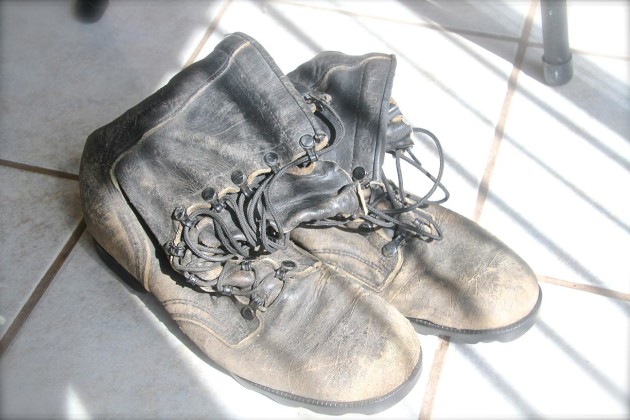
It amuses me to this day how wound up I was over the type of gear I thought was essential to successfully pass selection. There was a secret balance of ratio, I thought, between level of physical fitness and speed of cool-guy gear that was required to pass the course. I admit, I succumbed to every shit-house, armchair, shade tree, self-acclaimed expert who whispered the secret combination for passing selection. In retrospect, every one of those Albrecht Einsteins had one thing in common. That is, they were all missing one thing: a wall locker in a team room in one of the squadron bays of the Delta Force.
I had a genius inform me that the most state-of-the-art compass was entirely unnecessary, as the key to navigation in the mountains of West Virginia was an altimeter! I foolishly bought a watch with an altimeter on it.
On my initial ruck march with my new altimeter, I noted that it had not budged so much as a foot of elevation, plus or minus the true elevation of Key West in the past ten miles of marching, and it never would! Key West is only a few feet above mean sea level and flat as a pancake.
I climbed to the top of the 12-story BOQ building and…only 60 feet? What a piece of junk that altimeter turned out to be, and what a dolt I was for buying it in the first place.
Once all of my foolishness subsided, I surrendered to my military-issued M2 compass, lensatic, OD green in color, one each. My compass didn’t know the first thing about altitude, but it knew everything there was to know about north, no matter where it was, and that is all that really mattered.
There was one piece of gear that I agonized over long enough that I couldn’t abandon the notion of being without it. That would be a headlamp. I was pretty sure I would have to travel at least one time during the night hours. I would be wearing a heavy rucksack, carrying a rifle without a sling that, by protocol, must be carried in the hand, and a map. I had just run out of hands to carry a flashlight. The logical solution was to get a headlamp. I had no lead on where to procure such a luxury.
What does a Green Beret do when he doesn’t have something he needs? He makes it himself.
I configured a head harness out of straps and Velcro, a cradle to grab and hold a Maglite securely for at least eight hours, a horizontal stabilizing strap, a vertical stabilizer, and a final anchoring chin strap. I would tie a cravat on my head like a pirate, as a sort of saddle blanket, before I strapped on my Rube Goldberg of a device. Doing so would provide better grip and, ultimately, some comfort. I practiced putting it on and adjusting it many times in the dark of my house in Key West.
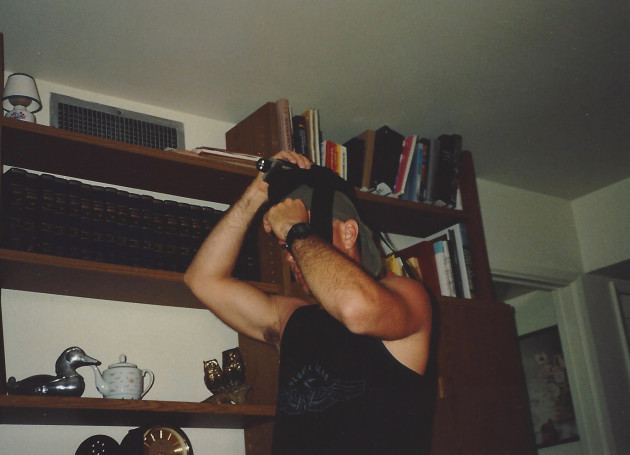
On the last day of the physical assessment phase of the course, we would stagger-start our long, final 40-mile trek. I awoke from my restless sleep at 0030 hours to find it pissing rain. I packed up my gear and configured my head light contraption in the dark, just like I had practiced at home so many times.
I reported to the cadre poncho tent at 0130 hours for my final departure brief. As I threw open the tent flap and stepped into the red light-illuminated space, the cadre took advantage of the next ten seconds to gawk in utter WTF at the bonnet and straps on my head. I envisioned them mentally flipping the pages of the selection and assessment “rule book,” trying to determine if my device did or didn’t qualify as accepted equipment for use in the selection course. The bottom line? It was an issued Maglite, so no harm, no foul.
I plotted my current position and then the position of my first rendezvous point. My God, was it really that far away? The cadre checked my two plots and released me from the poncho tent. I stepped out into the darkness and rain, reached up, and gave my Maglite a twist on. Kaboom, the path to my front lit up nicely and pretty well straight to the direction that my head and eyes were pointed to.
As I strained for the next three hours through the rain, rocks, and timber, my path stayed well-illuminated the entire time. I had become lost when I got to low ground where the existing streams were swollen, and previously non-existing rivulets appeared. There in the wetlands, I ran into an equally lost bud of mine—Markey-Mark “Cuz” C.
We exchanged a few words, which was against the rules, but we had not tried to communicate any navigation details. Instead, we just expressed an affirmation of how much we both despised our lives at that moment and our desire to extricate ourselves from our demise.
Minutes later, after post-holing aimlessly through a seemingly misplaced Louisiana bayou, we stumbled onto a military M-880 pickup truck. I reported in, plotted the next route of my journey on my map, and showed it to the cadre member. He agreed with my data and released me.
It was dawn now and bright enough to see without the flashlight. It had all but stopped raining as daybreak took charge of night. I stripped off my headlight, rolled it up, and stuffed it in my trouser cargo pocket. I had just gotten a leg up on the long walk.
—
Editor’s Note: Let’s all do Geo a solid. Go out and buy his book and visit his website. I promise it’s all good stuff. — GDM

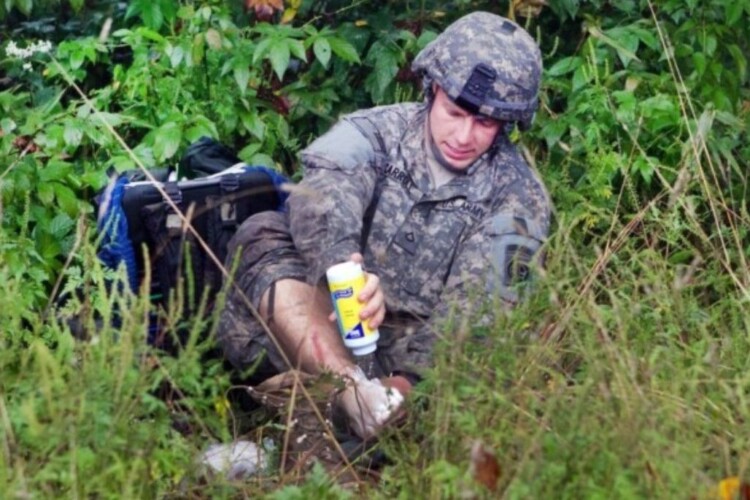
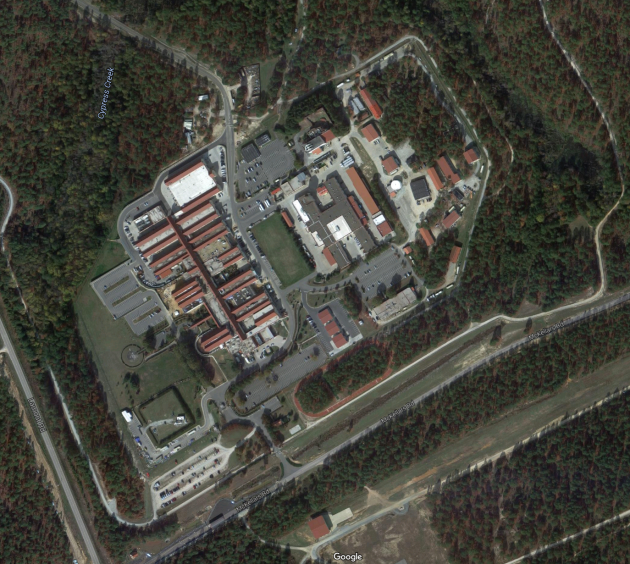
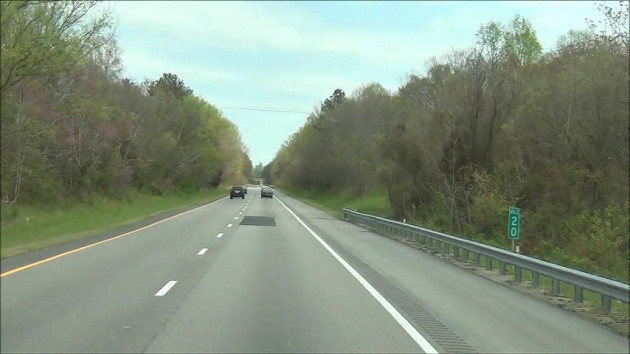
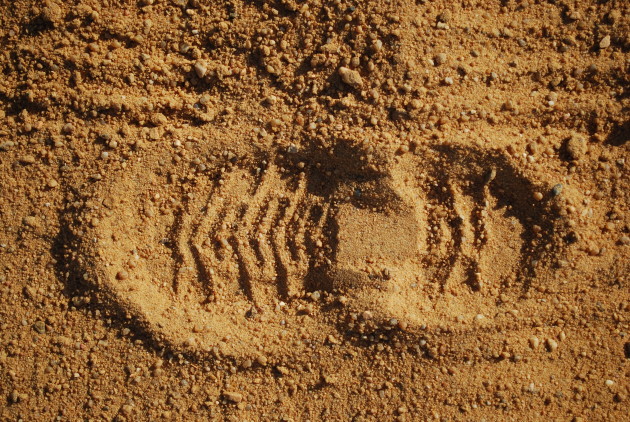
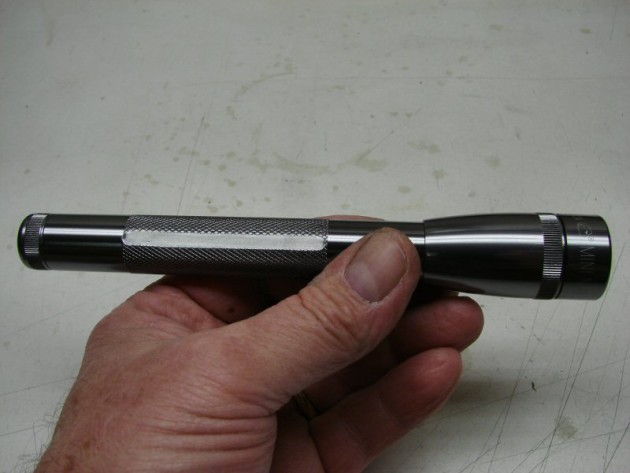
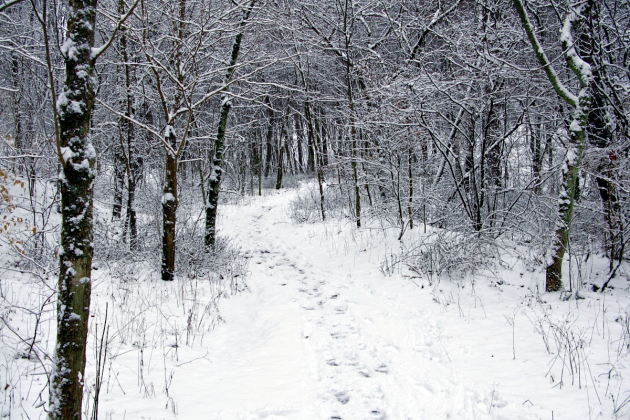








COMMENTS